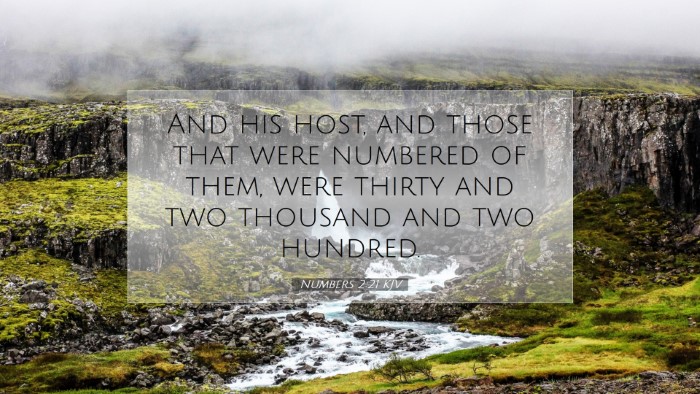Commentary on Numbers 2:21
Verse: "Of the children of Gershon were to take the tabernacle, and the tent of the congregation, and his covering, and the hanging for the door of the tabernacle of the congregation."
Introduction
Numbers 2:21 presents a key insight into the roles assigned to the Levites during their wilderness journey. This verse highlights the responsibilities of the Gershonites, one of the Levitical clans. The significance of their duties is manifold and demonstrates God’s orderly arrangement for His people. In examining this verse, we will draw from the depths of traditional commentaries, including those by Matthew Henry, Albert Barnes, and Adam Clarke, to yield a rich tapestry of understanding.
Contextual Background
The Book of Numbers primarily deals with the organization of the Israelite camp during their journey in the wilderness. It contains instructions on how the tribes should camp around the Tabernacle and the specific duties assigned to each tribe and the Levitical families. As we delve into the duties of the Gershonites, it’s essential to appreciate the broader context of the sacrificial system, the significance of the Tabernacle, and the function of the Levites.
The Role of the Gershonites
In this verse, the Gershonites are singled out for their role in transporting the Tabernacle and its coverings. Matthew Henry emphasizes the importance of this task as it relates to the sacredness of the items being transported, including the tent of meeting and its coverings. The reverence required in handling these items reveals to all the profound respect that God demands for His dwelling place among His people.
Responsibilities Assigned
-
Transportation of the Tabernacle:
The Gershonites were tasked with the care and transportation of the tent and the curtains, which were integral to the Tabernacle's structure. According to Albert Barnes, their role signifies the importance of preserving the sanctity of worship and the presence of God among His people.
-
Protecting the Sacred Elements:
Adam Clarke explains that by carrying the coverings, they were safeguarding the very elements through which God chose to commune with His people. Their function underscores the theme of holiness in the presence of God, a recurring motif throughout scripture.
The Theological Implications
This verse and its implications invite deeper theological reflection. The notion of God dwelling among His people (as symbolized by the Tabernacle) speaks to the incarnation of Christ and the subsequent indwelling of the Holy Spirit in believers (1 Corinthians 6:19). The responsibilities delineated for the Gershonites reflect care and reverence required in God’s service, which parallels the commitment necessary for those who serve in ministry today. Such a perspective encourages a reverent attitude in all facets of worship, as highlighted by Matthew Henry and echoed by Clarke.
The Order of Service
The organization of the Levites, particularly the Gershonites, underscores God’s intention for order and propriety in worship. Barnes suggests that this divine order prevented chaos and confusion, serving as a blueprint for God’s people when approaching sacred matters. This principle of order resonates with the apostolic instruction found in 1 Corinthians 14:40, “Let all things be done decently and in order.”
Application for Today
Understanding the duties of the Gershonites provides modern-day pastors, students, and scholars with valuable lessons on the importance of organization and reverence in the ministry. The act of handling sacred responsibilities should be approached with seriousness and care, reflecting an understanding of the holiness of God.
Lessons in Leadership
-
Delegation of Responsibilities:
Pastors should learn from the way tasks were distributed among the Levites, with each clan assigned specific responsibilities according to their gifts and abilities. Leadership today involves recognizing the strengths of individuals within the church body and assigning tasks accordingly.
-
Holiness in Service:
The sacredness of the task of the Gershonites reminds leaders of their calling to promote holiness within their congregations. The care with which they approached their duties should mirror the same vigilance with which churches should oversee worship practices and community life.
Reflective Questions
- How can church leaders better reflect the order seen in the Levitical arrangement in their church communities?
- In what ways can we cultivate a deeper reverence for God's presence within our worship practices?
Conclusion
Numbers 2:21 encapsulates significant truths about the nature of God’s dwelling among His people and the required response in service. Through the insights provided by esteemed commentators, we glean profound truths about the holiness, organization, and sacred responsibilities tied to worship. As we reflect on the role of the Gershonites, may we be encouraged to fulfill our own duties in the service of God with reverence and diligence as we lead others in grace and truth.


